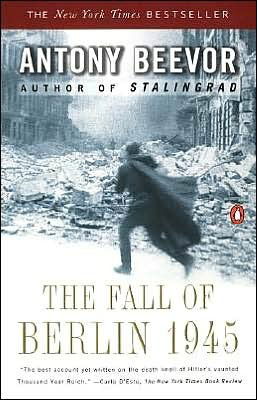
The last months of the Second World War is a subject that rarely makes an appearance in the plethora of book that are available on the topic. This books features material on some of the most barbaric events in German history, the growing ineffectiveness of Nazi leadership, whilst simultaneously highlighting several heroic actions across Berlin by hard pressed German soldiers. I will warn you now, this isn’t an easy read. The rape of Berlin by the revenging Red Army features prominently throughout this book. There are many accounts from German women that show the horrors inflicted upon the civilian populations trapped by the Soviet advances. Whilst difficult to read these sections are necessary in humanising the German people. It is far too easy to dismiss the civilians as being “Nazis” when many ordinary Germans felt that the party had lost its grip on reality.
The madness that overtook the bunker of the Nazi leadership as the Soviets closed in is also something Beevor extensively explores. The difference between those on the outside of the bunker and those within is stark. Whilst on the streets people were forced to line up in the open for food as shells rained down, in the bunker parties raged and life carried on normally. Hitler, when confronted with Soviet advances, frequently showed how out of touch with the situation he was. He is often quoted in this book as having sent orders for armies to counter-attack with divisions that no longer existed. The decision by many field commanders to ignore Hitler’s directives may have been what saved the lives of many Wehrmacht soldiers.
I was especially caught up in the decision of General Wenck to use the 12th Army to hold open a corridor for civilians and remnants of the 9th Army. This decision allowed these people to retreat to the River Elbe, and in doing so, surrender to the Americans rather than the Soviets. Wenck’s decision to disregard Hitler’s call for an attack towards Berlin gives us a real sense of how disenfranchised the Wehrmacht had become. For Wenck it wasn’t “about Berlin any more,” it wasn’t “about the Reich any more.”
This book should definitely be read after Beevor’s book on the bitter fighting at Stalingrad. This book is almost a parallel of Stalingrad except that the roles are reversed and the outcome is certain. As this book stays heavily focused on the conflict between the Soviet Union and Nazi Germany, it is a perfect partner to the other work and helps to complete the story of the Eastern Front like few others. In Stalingrad, the Wehrmacht is at the height of its power fighting an unprepared and poorly equipped foe. In this book, the Soviet Union has survived the onslaught of 1941 and learned the hard lessons it needed to. The Wehrmacht on the other hand, is desperately short of equipment and manpower and is in no state to seriously oppose the threat posed by the Red Army. The outcome is already decided before the book has begun but the story is still worth reading in a world where cities are still under siege and fighting happens in the streets.
Rating: 8 out of 10 Advertisements Share this:- More





